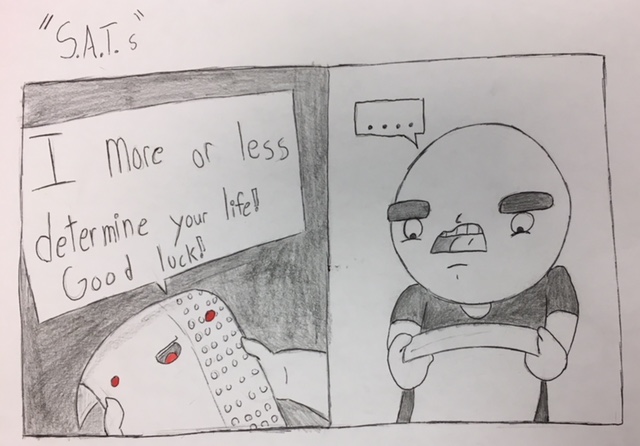How mighty is the SAT?
October 26, 2017
A few years ago, whether students liked it or not, the Scholastic Aptitude Test (SAT) was a huge part of their future. Seniors busied themselves applying to colleges and taking the SAT for the last time before they applied. Now, some seniors are choosing not to take the SAT because the schools they are applying to are part of the almost 1,000 colleges and universities who have adopted a test optional policy.
A test optional policy deems a student’s grades, rigor of schedule, and accomplishments more important than a few hours spent filling in bubbles. Test scores don’t show the full spectrum of intelligence. For example, students strong in musical, visual, and kinesthetic intelligence may be at a disadvantage because the SAT does not directly showcase their skills.
Other groups that are at a distinct disadvantage are low income students.There is evidence to support that students coming from higher income family score 250 points higher than those coming from lower income families.
Another inequity is that students have different levels of preparation. Khan Academy offers free SAT Prep online with 8 full practice tests that include the essay section. Even though Khan Academy is free online, the internet and computer required to access it are not. If a low-income student doesn’t have regular access to either of these, they have to go to a library or a friend’s house which might not be possible for long stretches of study time.
Poor test takers that are otherwise strong students are also at a disadvantage because the SAT is the epitome of stressful tests that, as a result, can misrepresent student’s level of intelligence.
For these students, nixing the SATs would strengthen their applications and it would be worthwhile to apply to a test optional school. In the state of Maryland, the schools that have become test optional are Goucher College, Hood College, Loyola University, McDaniel College, Notre Dame of Maryland University, Salisbury University, St. John’s College, and University of Maryland. (To find out if a school is test optional, use Fair Test’s comprehensive list of all test optional colleges and university.)
Goucher, Hood, Loyola, Notre Dame of Maryland, and St. John’s allow all students to omit test scores from their applications. However, Salisbury, McDaniel, and University of Maryland require that students have a 3.5 GPA or higher to utilize this policy.
If a student wishes to apply to one of the universities/colleges with a limited test-optional policy, but that student doesn’t meet the GPA requirements, don’t worry too much about your lower test scores. Admissions counselors don’t see SATs as the most important measure of intelligence. At University of Maryland, they have adopted a holistic review process of each application based on 26 factors and SAT/ACT scores are just one small part of the 26.
Goucher advertises that, “If your scores fall within the middle 50% or above, your scores would likely not have an adverse impact during the review of your application.” To those disadvantaged students who have their hearts set on applying to a university or college that is not test optional, this fact can cause panic if their scores are in the lower 25% because their acceptance hinges on a statistic that is not representative of the student as a whole.
It is a likely occurrence to apply to a school that requires test scores because out of the 5,300 colleges and universities in the US, only around 20% of them are test optional. And to some schools like Towson University, test scores are just as important as the rest of the application.
“As an academic institution, we consider any academic material to be most important. Your GPA, SAT/ACT test scores, course selection, and improvement can show a strong indication of future academic success. The GPA alone isn’t necessarily the most important piece as we’ll look at the course type, rigor, and improvement over all four years. Towson University does not have any plans to offer a test optional policy in the future,” said Jennifer Ziegenfus, an admission counselor at Towson.
College Board agrees with Towson and sees test scores and GPA as balancing subjective GPA with the objective SAT to create a complete picture of the student. The College Board website explains test-optional policies, “The SAT and high school GPA are reciprocal checks and balances for each other.”
Larger schools also use test scores as another statistic which helps narrow down who they send acceptance letters to. Also, at Towson, test scores are used to award scholarships. “Any fall semester freshman applicants who apply and have all materials submitted by the December 1 deadline will automatically be considered for merit-based scholarships. These scholarships have different ranges and criteria each year. Each year we offer scholarships to 25-30% of our admitted student population. The only factors we use to make the decision are high school GPA and test scores (SAT or ACT),” said Ziegenfus.
Towson’s argument is that SATs measure a student’s ability to think critically in the areas of math and reading which are essential skills needed for college. College exams can be just as stressful and demanding as the SAT and, regardless of test taking ability, students can’t avoid exams in college so it’s good to get acclimated to the college setting with the SAT.
While non-test-optional schools do have a point that the skills tested for on the SAT are needed in a college classroom, the test optional policy accounts for extenuating circumstances.
The SAT score also reduces students to a statistic… which isn’t necessarily the best way to determine acceptance. It could be argued, thought, that GPA is just a statistic. However, it is understandable that a large university would have a difficult time determining acceptance from personal essays, recommendation letters, resumes, and GPA alone. Universities and colleges are a business as well and, while strength of character is important in their students, it is also important to have students who are ready for college.
Skipping the SAT is not a “get out of jail free card.” It is best to study and take the SAT–make the decision to apply with or without the score depending on the college and its policies.
You should be choosing a college based on your love for that school and its programs, not on its admissions policies.













